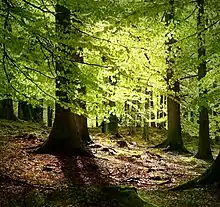лѣсъ
Old Church Slavonic

лѣсъ
Etymology
From Proto-Slavic *lěsъ.
Noun
лѣсъ • (lěsŭ) m
- forest
- woods
- from the Homily against the Bogumils, 1794-1796:
- бо би велѣлъ богъ не дѣлати чловѣкомъ то бꙑлиѥ жито би раждало и лѣсъ грозниѥ.
- bo bi velělŭ bogŭ ne dělati člověkomŭ to bylije žito bi raždalo i lěsŭ groznije.
- If God had ordered men not to work, plants would grow grain and woods grapes.
- from Vita Methodii, 0700210:
- и азъ на лѣсѣ надаю, своі дьнь съконьчавъ.
- i azŭ na lěsě nadaju, svoi dĭnĭ sŭkonĭčavŭ.
- Now my days are ending and I am waiting for the woods.
- from the Homily against the Bogumils, 1794-1796:
Old East Slavic

Лѣсъ (1).

Лѣсъ на земли (2).
Etymology
From Proto-Slavic *lě̑sъ. Cognates include Old Church Slavonic лѣсъ (lěsŭ) and Old Polish las.
Pronunciation
Declension
Declension of лѣсъ (hard o-stem)
Descendants
References
- Sreznevsky, Izmail I. (1902) “лѣсъ”, in Матеріалы для Словаря древне-русскаго языка по письменнымъ памятникамъ [Materials for the Dictionary of the Old East Slavic Language Based on Written Monuments] (in Russian), volumes 2 (Л – П), Saint Petersburg: Department of Russian Language and Literature of the Imperial Academy of Sciences, column 76
Russian
Noun
лѣсъ • (lěs) m inan (genitive лѣ́са, nominative plural лѣса́, genitive plural лѣсо́въ)
- Pre-1918 spelling of лес (les).
Declension
This article is issued from Wiktionary. The text is licensed under Creative Commons - Attribution - Sharealike. Additional terms may apply for the media files.